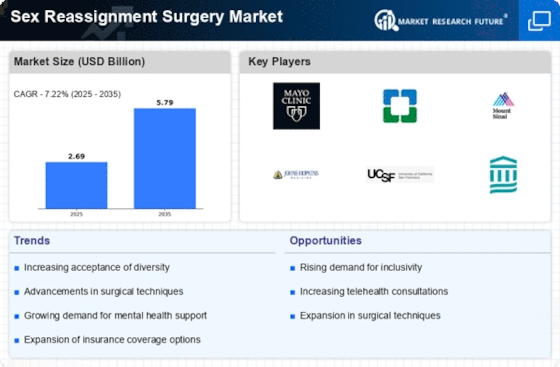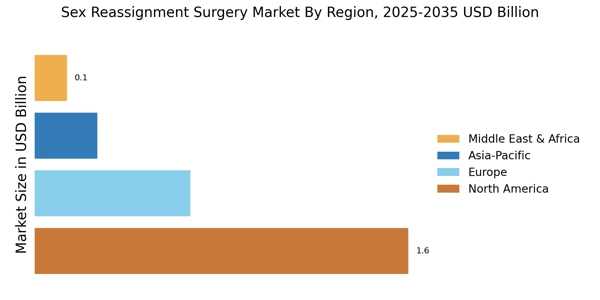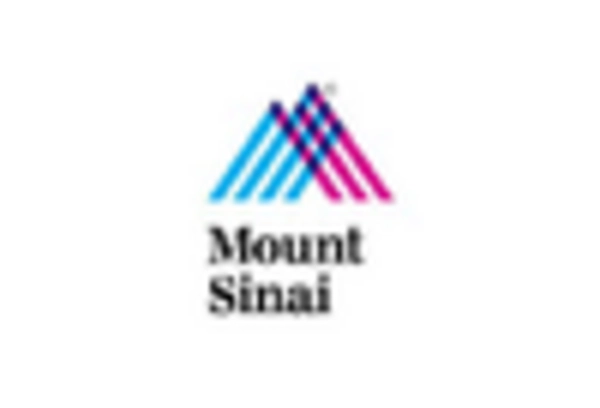Cultural Shifts and Social Movements
Cultural shifts and social movements are driving transformative changes within the Sex Reassignment Surgery Market. The rise of advocacy groups and social movements focused on transgender rights has fostered a more supportive environment for individuals seeking gender-affirming surgeries. These movements have not only raised awareness but have also influenced public perception, leading to greater acceptance of transgender individuals. Data suggests that regions with active advocacy efforts see higher rates of surgery requests, as individuals feel more empowered to pursue their gender identity. This cultural evolution is likely to sustain momentum in the market, as societal norms continue to evolve towards inclusivity and acceptance.
Rising Demand for Gender Affirmation
The increasing demand for gender affirmation procedures is a pivotal driver in the Sex Reassignment Surgery Market. As societal acceptance of diverse gender identities continues to grow, more individuals are seeking surgical options to align their physical appearance with their gender identity. Recent data indicates that the number of individuals pursuing sex reassignment surgeries has risen significantly, with estimates suggesting a growth rate of approximately 20% annually. This trend is fueled by a combination of factors, including enhanced visibility of transgender issues in media and advocacy for LGBTQ+ rights. Consequently, healthcare providers are adapting their services to meet this burgeoning demand, thereby expanding the market for sex reassignment surgeries.
Legislative Support and Healthcare Policies
Legislative support and evolving healthcare policies play a crucial role in shaping the Sex Reassignment Surgery Market. Many countries are increasingly recognizing the rights of transgender individuals, leading to the implementation of policies that facilitate access to gender-affirming surgeries. For instance, insurance coverage for sex reassignment procedures is becoming more prevalent, which significantly reduces the financial burden on patients. Data from various health departments indicate that regions with supportive legislation experience higher rates of surgery uptake. This legislative momentum not only enhances the accessibility of these procedures but also fosters a more inclusive healthcare environment, thereby driving growth in the market.
Increased Focus on Mental Health and Wellbeing
An increased focus on mental health and wellbeing is significantly influencing the Sex Reassignment Surgery Market. Mental health professionals are increasingly recognizing the importance of gender-affirming surgeries as a critical component of comprehensive care for transgender individuals. Research indicates that access to sex reassignment surgeries can lead to substantial improvements in mental health outcomes, including reduced rates of depression and anxiety. This growing awareness among healthcare providers is prompting more referrals for surgical interventions, thereby expanding the market. As mental health advocacy continues to gain traction, the integration of surgical options into holistic care models is likely to enhance the overall demand for sex reassignment surgeries.
Technological Innovations in Surgical Procedures
Technological innovations in surgical procedures are transforming the landscape of the Sex Reassignment Surgery Market. Advances in minimally invasive techniques, robotics, and 3D printing are enhancing surgical outcomes and reducing recovery times. For example, the introduction of laparoscopic methods has led to less postoperative pain and shorter hospital stays for patients undergoing sex reassignment surgeries. Market analysis suggests that these innovations are likely to attract more individuals to seek surgical interventions, as they promise improved safety and efficacy. As surgical techniques continue to evolve, the market is expected to expand, driven by the desire for better patient experiences and outcomes.

















